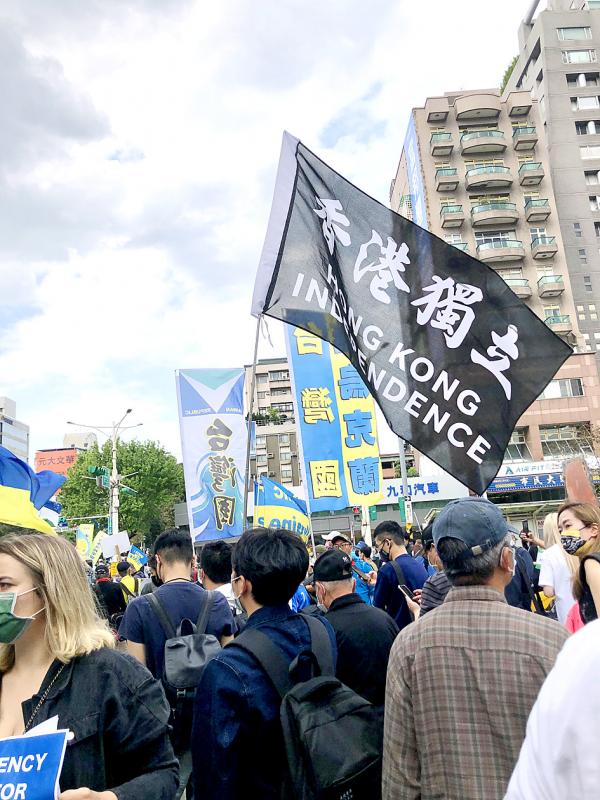Mainland Affairs Council (MAC) Deputy Minister Chiu Chui-cheng (邱垂正) yesterday denied allegations from foreign media that Taiwan has closed its doors to refugees fleeing persecution in Hong Kong.
Media reports saying that Taiwan refuses to naturalize or grant residency to Hong Kongers for being born in China is “untruthful,” Chiu told a news conference in Taipei.
His remark came after the Washington Post last week reported that Taiwan’s immigration authorities cite ties with China to deny residence to Hong Kongers, resulting in many of them leaving Taiwan.

Photo: Lo Chi, Taipei Times
Deutsche Welle the same day reported that many Hong Kong exiles living in Taiwan fear being deported because their alien resident status is insecure.
Chiu said that the most common reason for Hong Kongers to be denied residency is making undishonest claims about investing in Taiwan, followed by failing to pass a national security assessment.
False financial claims are related to a requirement that immigrants from Hong Kong have investments in Taiwan, he said, adding that shell corporations are often created to back untrue claims.
Being born in China or being a former member of the Chinese government, the Chinese Communist Party or the People’s Liberation Army pose national security risks that can negatively affect an application, he said.
However, immigration officials do not reject an applicant as a matter of policy; only if multiple risk factors are identified in the background check, he said.
“Media reports alleging that applications were denied due to these reasons were based on untruthful information,” he said.
Regarding the concerns of Hong Kongers that they could lose their residency status due to joblessness or the expiration of their passport, Chiu said that they should register with the Taiwan-Hong Kong Exchange Services Office.
The office provides assistance in matters of education, employment and healthcare, and officials have worked hard to ensure that these services are available to those in need, he said, adding that immigrants have nothing to fear.
However, when asked to comment on the number of Hong Kongers who have ties to China and have been granted residency, Chiu said that he was not prepared to answer before consulting records.
“Such questions should be directed to the agency in charge, which is the National Immigration Agency,” he said.
The government is committed to helping Hong Kongers on the condition that Taiwan’s national security is not compromised, he said, adding that policies are continually being reviewed and improved.
Yesterday marked the third anniversary of protests against a proposed extradition law in Hong Kong, he said, before reiterating the government’s support for freedoms in the territory.
“Taiwan joins the world in expressing concern for the erosion of freedom, democracy and rule of law in Hong Kong,” he added.

US climber Alex Honnold is to attempt to scale Taipei 101 without a rope and harness in a live Netflix special on Jan. 24, the streaming platform announced on Wednesday. Accounting for the time difference, the two-hour broadcast of Honnold’s climb, called Skyscraper Live, is to air on Jan. 23 in the US, Netflix said in a statement. Honnold, 40, was the first person ever to free solo climb the 900m El Capitan rock formation in Yosemite National Park — a feat that was recorded and later made into the 2018 documentary film Free Solo. Netflix previewed Skyscraper Live in October, after videos

Starting on Jan. 1, YouBike riders must have insurance to use the service, and a six-month trial of NT$5 coupons under certain conditions would be implemented to balance bike shortages, a joint statement from transportation departments across Taipei, New Taipei City and Taoyuan announced yesterday. The rental bike system operator said that coupons would be offered to riders to rent bikes from full stations, for riders who take out an electric-assisted bike from a full station, and for riders who return a bike to an empty station. All riders with YouBike accounts are automatically eligible for the program, and each membership account

NUMBERS IMBALANCE: More than 4 million Taiwanese have visited China this year, while only about half a million Chinese have visited here Beijing has yet to respond to Taiwan’s requests for negotiation over matters related to the recovery of cross-strait tourism, the Tourism Administration said yesterday. Taiwan’s tourism authority issued the statement after Chinese-language daily the China Times reported yesterday that the government’s policy of banning group tours to China does not stop Taiwanese from visiting the country. As of October, more than 4.2 million had traveled to China this year, exceeding last year. Beijing estimated the number of Taiwanese tourists in China could reach 4.5 million this year. By contrast, only 500,000 Chinese tourists are expected in Taiwan, the report said. The report

Temperatures are forecast to drop steadily as a continental cold air mass moves across Taiwan, with some areas also likely to see heavy rainfall, the Central Weather Administration (CWA) said. From today through early tomorrow, a cold air mass would keep temperatures low across central and northern Taiwan, and the eastern half of Taiwan proper, with isolated brief showers forecast along Keelung’s north coast, Taipei and New Taipei City’s mountainous areas and eastern Taiwan, it said. Lows of 11°C to 15°C are forecast in central and northern Taiwan, Yilan County, and the outlying Kinmen and Lienchiang (Matsu) counties, and 14°C to 17°C